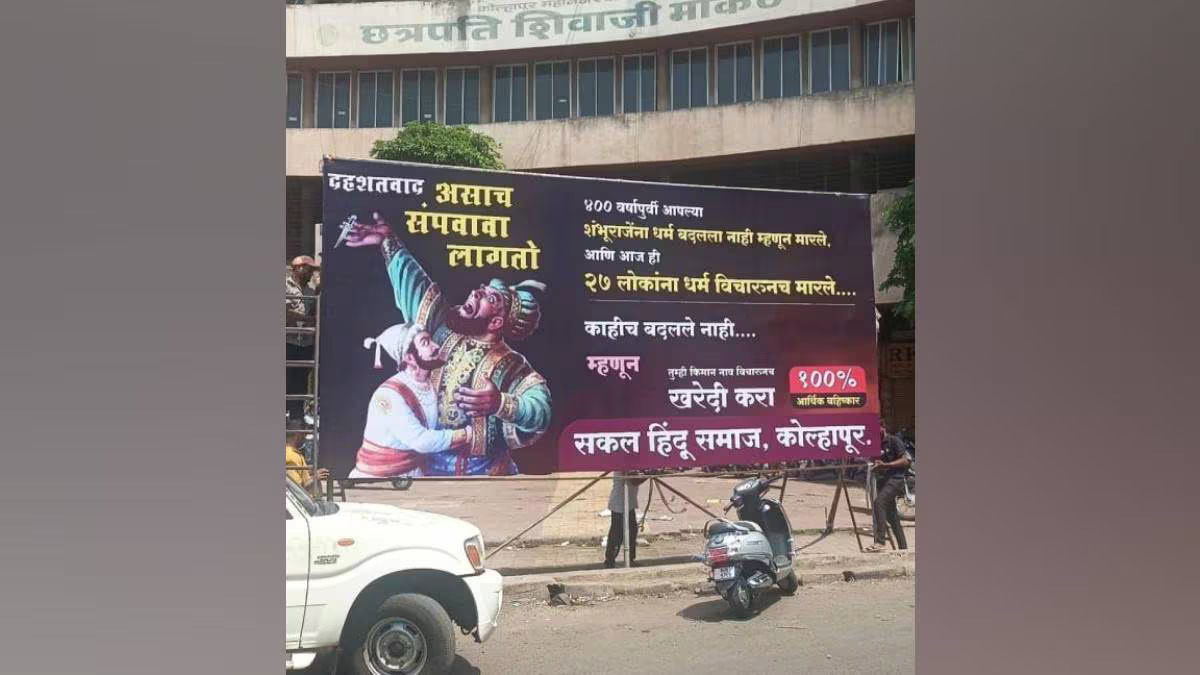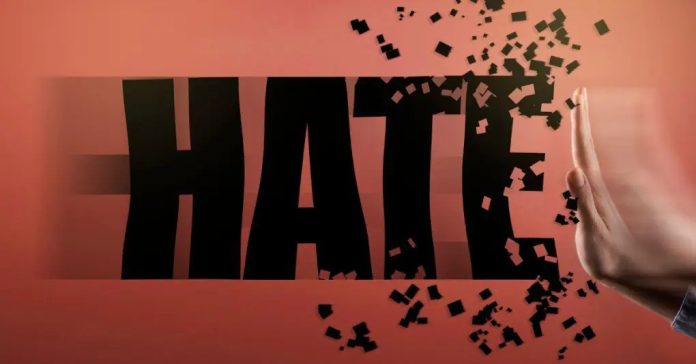Controversial placards on who to buy from were displayed in Kolhapur. The banner, which conveys a message to buy from Hindu traders, seems to have targeted minorities. Buy in the market only after asking for the name, there is a discussion in Kolhapur.

– Shahjahan Magdum
Certain groups within the country are using weapons like economic boycotts against Muslims to create social tension. This is not merely an act against one community but is tantamount to anti-national activities. These actions align with the intentions of enemy nations – to create an atmosphere of fear, hatred, and conflict in India.
Despite all this, it is unjust to blame Indian Muslims for violent incidents and boycotts instead of holding terrorists accountable. In the Pahalgam attack, Indian Muslims like Syed Adil sacrificed their lives to save tourists. Against this backdrop, imposing an economic boycott on Muslims is nothing short of an insult to their patriotism.
India’s democratic system is built on respect for diversity, grounded in the Constitution, and grants equal rights to all religions, castes, and creeds. However, in recent times, instances of social and economic boycotts against specific religious communities – particularly Muslim citizens – have repeatedly surfaced. These include forcing shops to shut down, calling for boycotts of their businesses, and running hateful campaigns on social media.
India is globally recognised for its unity in diversity. Yet, in recent years, certain organisations and social media platforms have openly called for economic boycotts against specific communities – especially Muslims – in various parts of the country.
Phrases like “Don’t buy fruits from them,” “Don’t shop at their stores,” or “Don’t use their taxis” are no longer limited to speeches but are visible on banners, posters, social media campaigns, and sometimes even in violent incidents.

These calls are not just symbols of hatred but shake the very foundation of Indian society. Religion-based economic boycotts are not merely a social aberration; they directly undermine national unity, economic stability, and constitutional values. Though these boycotts may seem social in nature, their consequences deeply wound the political, economic, and collective psyche. Therefore, this issue must be viewed not just through an emotional lens but from the perspective of a thoughtful and sensitive citizen.
These social boycott campaigns not only foster communal hatred but also challenge human rights, national integrity, and local laws.
Impact on Ordinary Citizens
The first and most severe impact of such boycotts is felt by citizens living hand-to-mouth. In cities like Mumbai, Pune, Indore, Prayagraj, Varanasi, Buldhana, and Belgaum, many true stories have emerged in the media about Muslim vendors losing customers solely because of their names.
The first blow of any economic boycott hits the person at the bottom of society – the street vendor, rickshaw driver, cart puller, fruit seller, or tea vendor. This boycott is imposed under the label of “Muslim,” affecting people across all strata. As a result, the livelihoods of innocent individuals who have committed no wrong are jeopardised. This leads to two outcomes: (1) increased social division and (2) intensified economic inequality.
According to a 2022 report by Oxfam India and NCDHR, boycott-affected individuals suffer an average economic loss of 30 to 70%. Due to “social pressure,” Muslim shopkeepers’ businesses have shut down, and in some places, police have advised closing shops.
For example, in 2023, a WhatsApp group in a village in North India circulated a message urging Hindus not to buy from Muslims. As a result, the income of 18 Muslim shopkeepers in that village dropped by 80% within a week. Some of them were forced to leave the village.
According to a CSDS-Lokniti report, in 2022, 52% of surveyed Muslim citizens felt they faced undeclared discrimination in social transactions. This fuels radicalisation, ends dialogue, and fertilises hatred.
Contribution of Muslims to India’s Informal Sector
India’s economy is over 90% dependent on the informal sector. According to a 2022-23 SBI report, the informal sector contributes 44.25% to the country’s Gross Value Added (GVA) and provides employment to 74.3% of the working population. The Muslim community has a significant contribution to this sector.
Importance of the Informal Sector
- Contribution to Income: The informal sector contributed approximately 44% to India’s total GVA in 2022-23.
- Employment: About 74.3% of the country’s workforce is employed in this sector, with a significant share from minority communities.
Muslim Community’s Participation
The Muslim community participates in various businesses in the informal sector:
- Trade and Services: Fruit vendors, rickshaw drivers, taxi drivers, small shopkeepers, artisans, and household industries employ Muslims in large numbers.
- Industry: Muslims have significant participation in small-scale industries.
- Textile Production and Sales: The Muslim community contributes significantly to the textile industry.
- Agriculture and Related Businesses: Muslims are active in the sale of agricultural products, animal husbandry, and related businesses.
- Retail Trade: Many Muslims work as fruit vendors, cart pullers, tea sellers, and small shopkeepers.
- Tailoring, Handicrafts, and Artisanship: Muslim artisans are skilled in various handicraft products.
- Rickshaw, Taxi, and Truck Drivers: The number of Muslim drivers in public transport services is significant.
- Retail Sales, Meat and Poultry Businesses, Bakeries, and Eateries: Muslims contribute significantly to these sectors as well.
The Muslim community’s participation in these sectors significantly contributes to the country’s economic development.
Impact on the National Economy
India’s economy is based on the dialectical relationship between sellers and buyers. Beyond religion, caste, or language, every Indian citizen produces and consumes. The minority Muslim community contributes approximately 11-12% to India’s total GDP (NSSO, 2018 report). They have a strong presence in small industries, handicrafts, textiles, bakeries, fruit markets, taxi services, and retail trade.
If this community is excluded from economic transactions due to fear or actual boycotts, the entire economic chain is disrupted. A boycott of fruit vendors means farmers’ produce won’t find a market. A boycott of taxi drivers affects vehicle manufacturers’ products. This directly threatens government initiatives like ‘Make in India’ and ‘Startup India.’
In a democratic country like India, ‘economic social boycott’ may be an informal restriction, but its consequences are as severe as a formal crisis – market instability, job losses, and a lack of trust.
India’s economy is 90% dependent on the informal sector, where minorities – especially Muslims – participate significantly. For example:
- 36% contribution of Muslims in the textile industry.
- 25-30% in leather crafts, fruit markets, taxi services, and retail sales.
- 20% of Muslim entrepreneurs in small and cottage industries.
These sectors boost not only societal but also national production, create jobs, and drive local markets. However, boycotts disrupt this chain.
For instance, if Muslim fruit vendors are boycotted in a city, it affects farmers, transporters, and traders at all levels. This negatively impacts overall economic activities.
Moreover, such incidents tarnish India’s “Ease of Doing Business” and “Inclusive Growth” image internationally.
Potential Consequences of Economic Boycotts
Religion-based economic boycotts can have the following impacts on the country’s economy:
- Decline in Consumption: Boycotting the economic activities of the Muslim community can reduce consumption, affecting overall economic growth.
- Income Reduction: Boycotts on informal sector businesses can significantly reduce the country’s total GVA.
- Impact on Employment: Boycotts can affect the employment of Muslims in the informal sector, potentially increasing unemployment.
- Social Tension: Economic boycotts can increase social tension, impacting the country’s social harmony.
- Impact on Minority Communities: Boycotts on the Muslim community can adversely affect their standard of living.
Social Hatred and Threat to National Unity
Religion-based boycotts are not just an economic issue but a deeply rooted tree of social inequality. Calls for boycotts create an atmosphere of hatred, suspicion, and enmity in society. Often, this atmosphere turns violent – humiliation of schoolchildren, public shaming, physical assaults, etc.
According to a 2022 CSDS survey, 35% of Muslim citizens feel they are not ‘fully safe’ in India. Boycott campaigns darken this mindset further.
Such an environment increases insecurity among citizens, which is extremely harmful to national unity. “Unity in Diversity” is India’s soul. Boycotts cause this soul to decay.
Solutions within the Constitutional and Legal Framework
The Constitution of India guarantees every citizen personal freedom, equality, and the freedom to choose their profession. Discrimination based on religion violates Article 15. Under IPC Sections 153A (promoting enmity based on religion, race, place of birth, etc.) and 505(2) (statements creating enmity in society), legal action can be taken against boycott calls.
Additionally, Article 19(1)(g) grants everyone the right to freely choose their profession, trade, or lawful business.
Under the Bharatiya Nyaya Sanhita (BNS) 2023, spreading religious hatred, creating enmity, or issuing violent challenges like economic boycotts are criminal acts.
Thus, boycotting Muslim vendors or prohibiting purchases from them is not just undeclared social violence but also a constitutional offence.
Maharashtra Prohibition of People from Social Boycott Act, 2016
In 2016, the Maharashtra government enacted the “Maharashtra Prohibition of People from Social Boycott (Prevention, Prohibition and Redressal) Act.” This law strictly prohibits boycotts based on social, religious, caste, or traditional reasons. Key features of the law:
- Section 3: Any form of social boycott – based on religious rituals, profession, food culture, marriage, economic transactions, or social participation – is prohibited.
- Section 6: Individuals imposing or inciting a boycott can face up to three years in prison and a fine.
- Section 8: Offences under this law are non-bailable and serious in nature.
- Section 10: Victims can directly file complaints at a police station or with district authorities, and hearings are held in special courts.
This law not only punishes those imposing boycotts but also ensures social harmony. When Muslim vendors, shopkeepers, labourers, drivers, or students face boycotts based on religious identity, this law acts as a protective shield.
The Maharashtra Social Boycott Act can be a highly effective tool if:
- The police system is vigilant;
- Affected citizens are aware of the law; and
- Access to justice is simplified.
Effective implementation of this law requires local-level awareness and administrative alertness. Additionally, the National Human Rights Commission (NHRC) and the Minority Commission need to monitor such incidents and act. Every conscientious citizen must remain vigilant to uphold social brotherhood, constitutional values, and the legacy of collective understanding. Therefore, social workers, lawyers, local self-government bodies, and journalists must launch awareness campaigns on this issue.
International Implications and India’s Image
India is internationally recognised as a land of democratic values and social harmony. However, such incidents tarnish India’s image.
In its 2023 report, the USCIRF (United States Commission on International Religious Freedom) expressed concern over increasing attacks on religious minorities in India. This was highlighted in international media like The Guardian, BBC, and Al Jazeera. Economic boycotts lend credibility to these allegations, potentially creating obstacles in trade-beneficial schemes like the Generalised System of Preferences (GSP). The European Union’s trade partnerships have human rights criteria, and such boycotts could hinder India’s trade deals.
Moreover, many international companies, especially investors from Gulf nations, may consider withdrawing from the Indian market. In 2020, after anti-Islamic statements were made on some Indian social media accounts under the hashtag ‘Boycott Muslims,’ GCC (Gulf Cooperation Council) nations reacted strongly against India. Incidents of Indian goods being targeted occurred in markets in Kuwait, Qatar, and the UAE.
Against this backdrop, India’s value-based democratic image is at risk. Multinational investors assess the environment for minorities. If India falls short in Human Rights Due Diligence criteria, foreign investment could stall.
Human Rights Watch’s “World Report 2025” expressed concern over India’s human rights situation, mentioning violence against minorities, particularly Muslims, rising nationalist rhetoric and discriminatory policies. Economic boycotts further damage India’s international reputation, potentially impacting trade and foreign investment.
In the United States, economic boycott campaigns have gained momentum, such as the “Economic Blackout” campaigns organised by The People’s Union USA, targeting large corporations and DEI (Diversity, Equity, Inclusion) policies. While these campaigns are not directly related to religion-based boycotts in India, they highlight the global rise of boycotts as a tool to express social and economic discontent, which could indirectly influence the context in India.
Dialogue, Not Boycotts, Is the Need of the Hour
When someone imposes a boycott based on religion, they are not just targeting an individual or a community but are effectively boycotting the Indian Constitution. It is an assault on India’s prosperity, equality, economic progress, and global reputation.
Legal measures are already in place to counter such incidents, but what is needed even more is social awareness. Citizens must understand that calls for boycotts do not only harm others but also weaken us economically and morally.
Such boycott campaigns do not merely harm one community; they jeopardise the economic, social, and national interests of us all. If we abandon our tradition of coexistence, dialogue, and mutual understanding, the consequences will not be limited to the present but will prove disastrous for future generations as well.
The informal sector, particularly the Muslim community, plays a critical role in India’s economic and social development. Religion-based economic boycotts are dangerous not only for minority communities but also for the country’s economy and social harmony. Therefore, ensuring the participation of all communities is essential for inclusive and balanced development.
In this country, the Constitution grants every individual the freedom of religion, profession, and expression. Those who attempt to snatch these rights are not only legally culpable but also morally unfit.
Under the Indian Penal Code (IPC), Section 153A treats acts that promote enmity based on religion as serious offences. Section 295A addresses acts that outrage religious feelings, while Section 505 penalises false or hateful statements that incite social tension.
Against this backdrop, when calls for boycotts against a specific community are made on social media, they constitute not just social injustice but also acts punishable by law. Police and administrative authorities must take swift and strict action against such incidents. Merely offering “advice” or stating “investigations are underway” reflects a weakness in the justice system.
At the same time, the National Human Rights Commission (NHRC), the Minority Commission, and other civil society organisations must take an active role in addressing this issue. These institutions should monitor local incidents, submit reports to the government, raise awareness through the media, and provide legal assistance to victims.
The Role of Education, Media, and Awareness
Fighting religion-based boycotts requires not only legal measures but also a transformation in societal mindset. This transformation demands active participation from educational institutions, media, and social leaders. Schools and colleges should conduct awareness programmes based on constitutional values, incorporate curricula that respect diversity, and use stories and films that promote social harmony.
The media must take a stand not just with “neutrality” but on the side of justice. When media outlets remain merely “neutral” under the guise of objectivity, injustice proliferates. The media should highlight the true stories of citizens victimised by boycotts, create programmes that foster social harmony, and provide platforms for hate-free dialogue.
Ultimately, the time has come for every citizen to reflect on what kind of India we are strengthening through our actions – a toxic India riddled with discrimination or an India fragrant with unity in diversity. Standing against religion-based boycotts is not just about protecting minority rights but about safeguarding our constitutional values. Therefore, as a society, we must stop those who sow social discord in the name of economic boycotts – this is the true way to protect India’s national unity.
References
- Oxfam India & NCDHR Joint Report on Economic Discrimination (2022)
- USCIRF Annual Report (2023)
- NSSO Survey on Minority Economic Contribution (2018)
- CSDS-Lokniti Survey on Religious Perception (2022)
- Articles 14, 15, 19 & 25 of the Constitution of India
- Indian Penal Code – Sections 153A & 505(2)
- News Reports from The Hindu, Scroll.in, BBC, The Wire, Al Jazeera (2020–2024)
- Maharashtra Protection of People from Social Boycott (Prevention, Prohibition and Redressal) Act, 2016
- SBI Report on Formalisation of Economy (2024)
- GS SCORE: Informal Sector Employment Trends in India
- “Rs 26 trillion of India’s economy formalised in FY16-FY23, says SBI”, Business Standard, 22 June 2024.
- “Informal Sector Employment Trends in India”, GS SCORE.
- “Empowering India’s Informal Economy”, Next IAS, 25 September 2024.
- “Informal Sector Loses Rs 11.5 Trillion, 16M Jobs Post Shocks”, Deccan Chronicle, 9 July 2024.
- “Note-ban, GST, COVID shave off 4.3% of GDP of informal sector”, The New Indian Express, 10 July 2024.
[The writer is Executive Editor of “SHODHAN”, the Marathi weekly published from Mumbai, Contact: 8976533404]




